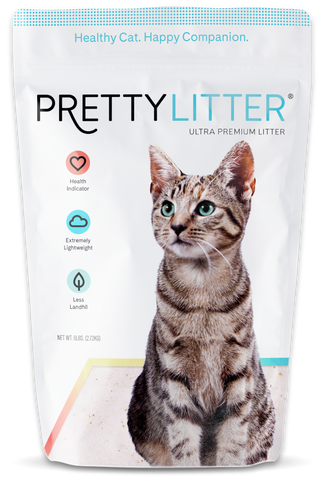December 4, 2018 |5 min read
A Tale of Two Cats: How Age Affects Our Cats

Written by

Cat Litter That Prioritizes Their
Health & Your Happiness.
to get your first bag for only $14.99
Each cat ages differently. Rewind 20 years. I was in elementary school when our cat Otis died. My mom had gotten Otis from a great-aunt when he was a year old. She loved the way he hunted all day in the yard, purred like an engine when he sat down, and took a siesta on the sunlit limestone table in our garden. So, it took six months, maybe a year, until she was ready to get another cat. This time, she picked two.
They were both girls. In the animal shelter, the pen in which we found them was swarming with kittens fighting, dashing, rolling around, swatting each other’s heads. My mom picked out a pretty black kitten who sat in the corner giving herself a bath. Then she lifted up a tabby who had been curled up while other kittens stepped on her head in the course of their play.
The black cat we named Zelda. The tabby, Hazel. For the first few weeks, Zelda and Hazel slept together in the basement bathroom, in a shoebox that we cushioned with a towel. They were so small that they could stand upright in the palm of our hand. They were both calm, which is the reason my mom picked them out, but their personalities were distinct from the get-go.
When they grew up, Hazel became dominant, even though Zelda was more athletic. She was a natural hunter and practically lived outside – roaming the garden beds and stalking voles in the summer, bedding under the leafless shrubs in the winter.
Whenever she explored the maze of alleys behind our house, she might be gone for a few days before trotting back to our patio. Hazel occasionally propped her paws on the windowsill and stared outside. Otherwise, she never left the house. She slept in the screened-in porch on fall evenings, and in the winter, she slept some more on a towel rolled out next to the hall radiator. (She wasn't exactly mouser material)
As they got older, they aged differently, too. Zelda had never made much noise, but when she was about 15, she went totally silent. Then she stopped ranging so far in the neighborhood. On cold nights, we’d lift her out from under the garden shrubs and bring her indoors.
Soon her world narrowed to a 30-foot circumference between the back door (where her food and water bowls were set out) to the patio (where she used to hunt). One spring morning we found her in the garden, under a patch of hydrangea bushes. She had died that night from old age.
Zelda seemed to get sweeter and calmer as she got older. Not Hazel. She was brassy and pushy where Zelda was graceful and alluring, but she was also consummately competent. She knew where the litter box was and gave herself a bath every two hours, it seemed, but, when she got to be about 15, her mood soured.
The noise she made had always resembled a yap rather than a meow, but in her final years, it turned into a full-on bray. She weighed less than 5 pounds, so it was jarring to hear her emit a noise that erupted through the house like a foghorn. In the last weeks of her life, those moans turned to sad, pained squeaks. The vet told my mom that her organs were failing. We had to put her down at the age of 17.

My mom had loved Otis, but she said it pained her, even more, to watch Hazel and Zelda become frail and age, each in their own way. She misses them so much that she says they'll be her last pets.
If you're scrolling through our site, chances are, you've got a cat story, too. Care to share? Leave your thoughts at the end of this article on the different ways that your own cats have aged.
----
Don't forget to follow us on Instagram: @prettylittercats
----
Delivered straight to your front door, every month. We’ll even pay your shipping.
For a limited time only, get 20% off your first PrettyLitter order. Enter code “LOVE20” at checkout. Redeem Now!










